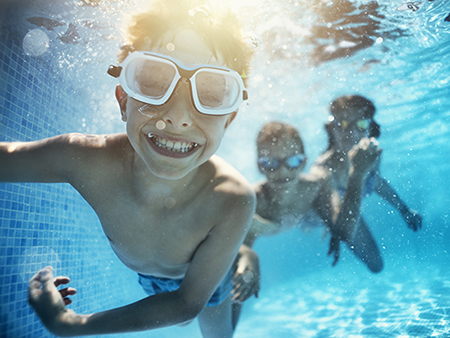As pool season approaches, it’s important to think beyond sunscreen and swimsuits—eye protection deserves your attention too. Whether you’re swimming laps, cooling off, or floating lazily, your eyes are exposed to pool chemicals like chlorine, which can cause irritation and even lead to infections.
While chlorine plays a key role in killing harmful bacteria in pool water, too much exposure can lead to uncomfortable symptoms such as dryness, redness, and burning sensations. It can also interfere with your natural tear film, leaving your eyes feeling gritty or inflamed.
To help you enjoy your swim without harming your eyes, here are four straightforward ways to guard against chlorine exposure.
1. Put On Swim Goggles to Avoid Direct Contact
One of the most effective ways to prevent chlorine-related eye issues is to wear snug, watertight swim goggles.
Goggles are beneficial because they:
- Block chlorine and other chemicals from directly reaching your eyes
- Lower the chance of developing red, dry, or irritated eyes
- Improve underwater vision and swimming comfort
- Serve as a barrier against bacteria and pool contaminants
If you wear contacts, opt for prescription goggles instead. Wearing regular contact lenses in the pool can trap bacteria between the lens and eye, increasing your risk of infection.
2. Keep Your Body and Eyes Hydrated
Chlorine doesn’t just dry out your skin—it also affects your eyes. Staying hydrated is one way to counteract this.
How hydration helps your eyes:
- Maintains healthy tear production before and after swimming
- Makes dry, itchy eyes less likely
- Minimizes the effects of chlorine exposure on your vision
Bonus: Eating foods rich in omega-3 fatty acids—like walnuts, flaxseed, and fish—supports natural eye moisture from the inside out.
3. Apply Lubricating Eye Drops to Restore Moisture
Even with goggles and good hydration habits, your eyes may still come into contact with pool chemicals. That’s where artificial tears or lubricating eye drops come into play.
Why use them:
- Help wash away chlorine particles that may linger
- Provide moisture to soothe dryness and discomfort
- Offer relief for contact lens wearers before and after swimming
When to apply:
- Before entering the pool: Add a couple of drops to protect the tear film
- After your swim: Use drops to cleanse your eyes and rehydrate
If you struggle with dry eyes regularly, consult your eye doctor for prescription-strength drops.
4. Rinse Your Eyes Thoroughly Post-Swim
Immediately after swimming, it’s essential to remove any leftover chlorine residue from around your eyes.
How to rinse effectively:
- Splash clean, cool water on your face to flush out chemicals
- Clean around your eyes, lashes, and brows—areas that trap residue
- Don’t rub your eyes, as it can spread irritants and worsen symptoms
- For added relief, use a cool compress if irritation lingers
Extra Reminder: Avoid Wearing Contact Lenses in the Pool
Swimming with contacts is strongly discouraged.
Here’s why:
- Water can trap microorganisms between your contact lens and cornea
- Pool chemicals can change the shape or comfort level of the lenses
- Contacts can absorb pool water, leading to blurry vision and eye irritation
If you need vision correction in the water, speak with your optometrist about daily disposable lenses or custom prescription swim goggles.
